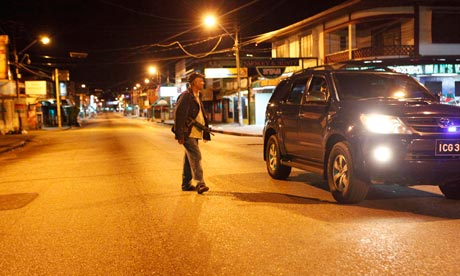By Brittney Hodnik
Impunity Watch Reporter, North America
WASHINGTON, United States – Former Vice President Dick Cheney told the Associated Press this week that he has “no regrets” about waterboarding and the other harsh interrogation tactics used during his time in office. After September 11, 2001, the government, specifically the CIA, used controversial waterboarding policies against “high value detainees” to extract important information.

Waterboarding is a highly criticized and widely debated technique used to obtain information from enemies or detainees. The process involves pouring water over the mouth and nose of an immobile individual, simulating the feeling of drowning. Along with profound psychological damage, waterboarding can cause lung damage, brain damage, dry drowning, and in extreme cases, death.
President Bush and his colleagues argued that this was not a form of torture, while many still believe that it is. The CIA admitted to using waterboarding techniques post-September 11 attacks. Since then, President Obama has banned the use of such tactics.
In his interview with NBC, former Vice President Cheney says that he stands by the use of waterboarding and would use it again if the situation arose. “I would strongly support using it again if we had high value detainee and that was the only way we could get him to talk.”
Cheney’s recent schedule has been full of media appearances, promoting his new book, “In My Time: A Personal and Political Memoir,” scheduled to hit bookstores Tuesday, August 30. The book unleashes a fury of inside information from Cheney’s time in the White House with then President, George W. Bush. Cheney admitted that the memoir will “have heads exploding all over Washington,” as reported in The Los Angeles Times. The memoir will discuss Cheney’s health, the September 11 attacks, and his thoughts on George W. Bush, among other topics.
In addition to his support for waterboarding, Cheney admits to urging President Bush to bomb a nuclear plant in Syria, as reported by The New York Times. He was the lone voice proposing the attack, citing the fact that “not a single hand went up around the room” when asked by President Bush who agreed with Vice President Cheney.
Overall, the book defends the Bush administration’s decision to use “tough interrogations” – refusing to classify such techniques as torture, according to The New York Times. Cheney stands by the use of such techniques suggesting that the CIA extracted information that saved lives.
Cheney’s full interview with NBC Dateline will air Monday, August 29 at 10:00 p.m., Eastern Time, discussing his thoughts on waterboarding and other issues.
For more information, please visit:
The Atlantic — Powell: Cheney’s Book is Full of ‘Cheap Shots’ – 29 Aug. 2011
The Associated Press – Cheney ‘No Regrets’ About Waterboarding Suspects — 25 Aug. 2011
The Los Angeles Times — Dick Cheney Says Memoir Will Have “Heads Exploding” — 25 Aug. 2011
The New York Times — In Book, Cheney Says He Urged Bush to Bomb Syria Nuclear Site — 24 Aug. 2011


